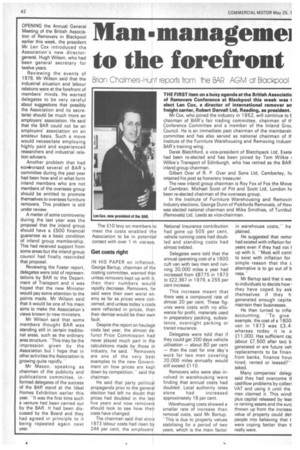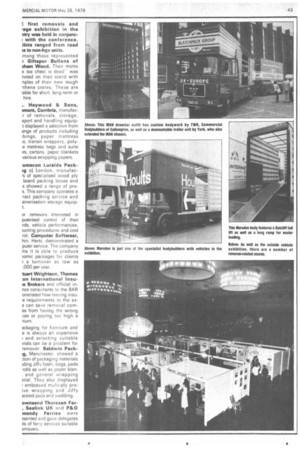an managemei to the forefront
Page 44

Page 45

If you've noticed an error in this article please click here to report it so we can fix it.
Brian Chalmers-Hu t reports from e BAR AGM at Blackpool
OPENING the Annual General Meeting of the British Association of Removers in Blackpool earlier this week, the president Mr Len Cox introduced the Association's new directorgeneral, Hugh Wilson, who had been general secretary for twelve years.
Reviewing the events of 1978, Mr Wilson said that the industrial situation and labour relations were at the forefront of members' minds. He warned delegates to be very careful about suggestions that possibly the Association and its secretariat should be much more an employers' association. He said that the BAR could not be an employers' association on an amateur basis. Such a move would necessitate employing highly paid and experienced researchers and industrial relation advisers.
Another problem that had eon.f.ronted several of BAR's committee during the past year had been how and in what form inland members who are not members of the overseas group should be entitled to promote themselves to overseas furniture removers. This problem is still under review.
A matter of some controversy during the last year was the proposal that the inland group should have a £500 financial guarantee as a basic condition of inland group membership. This had received support from some areas but the inland group council had finally rescinded that proposal.
Reviewing the Foster report, delegates were told of representations by BAR to the Department of Transport and it was hoped that the new Minister would pay some attention to the points made. Mr Wilson said that it would be one of his main aims to make the Association's views known to new ministers.
Mr Wilson said that some members thought BAR was standing still in certain traditional areas, such as the ordinary area structure. "This may be the impression given by the Association but I hope that in other activities the Association is growing quite rapidly."
Mr Mason, speaking as chairman of the publicity and publications committee, informed delegates of the success of the BAR stand at the Ideal Homes Exhibition earlier this year. it was the first time such a venture had been carried out by the BAR. It had been discussed by the Board and they had agreed in principle to it being repeated again next year." The £10 levy on members to meet the costs enabled the Association to be in potential contact with over 1 m visitors.
Get costs right
IN HIS PAPER on inflaticJi, George Bartup, chairman of the costing committee, warned that unless removers kept up with it, then their numbers would rapidly decrease. Removers, he said were their own worst enemy as far as prices were concerned, and unless today's costs were reflected in prices, then their demise would be their own fault.
Despite the report on haulagle costs last year, the almost d funct Price Commission ha never played much part in the calculations made by those ih industry, he said. "Removers are one of the very best examples to the new Government on how prices are kept down by competition," said the chairman.
He said that party political propaganda prior to the general election had left no doubt that prices had doubled in the last five years and now removers should look to see how their costs have changed.
The chairman said that since 1973 labour costs had risen by 244 per cent, the employers' National Insurance contribution had gone up 505 per cent, vehicle running costs had doubled and standing costs had almost trebled.
Delegates were told that the annual operating cost of a 1600 cult van with two men and running 20,000 miles a year had increased from E8775 in 1973 to [22,367 in 1979, a 255 per cent increase.
This increase meant that there was a compound rate of almost 20 per cent. These figures were costs with no allowance for profit, materials used in preparatory packing, subsistence, overnight parking or transit insurance.
Delegates were told that if they could get 200 days vehicle utilisation — about 80 per cent — then the cost for one day's work for two men covering 20,000 miles annually would still exceed £110.
Removers who were also involved in warehousing were finding that annual costs had doubled. Local authority rates alone had increased approximately 18 per cent.
Warehousing costs showed a smaller rate of increase than removal costs, said Mr Bartup. "This is due to property values stabilising for a period of two years, which is the main factor in warehouse costs," he plained.
He suggested that remo, had existed with inflation for years even if they had not up with it. "Most will conti to exist with inflation for simple reason that the c alternative is to go out of b ness."
Mr Bartup said that it wa: to individuals to decide how , they have coped by ask themselves if they h generated enough capita maintain their businesses.
He then turned to infla. accounting. "To give example, the cost of a 1600 van in 1973 was E3,4 whereas today it is o £11,000. Has sufficient car (about £7,500 after tax) b generated or are future veh replacements to be finani from banks, finance houE hired, rented or leased?" asked.
Many companies' delew said they had overcome tl cashflow problems by colleci VAT and using it until the man claimed it. This windi plus capital released by leas or renting assets and the sunr thrown up from the increas: value of property could deli people into believing that t were coping better than tl really were. E first removals and rage exhibition in the miry was held in conjunc with the conference. ibits ranged from road is to non-hgv units.
.mong those represented e Giltspur Bullens of sham Wood. Their motto e tea chest is dead" was noted on their stand with riples of their new tough rthene crates. These are 'able for short, long-term or hire.
L. Haywood & Sons, smont, Cumbria, manufacT of removals, storage, sport and handling equip.t displayed a selection from ange of products including ibings, paper mattress :s, transit wrappers, polyle mattress bags and suite :rs, cartons, paper blankets various wrapping papers.
umacon Luraida Packig of, London, manufacrs of specialised wood ply board packing boxes and is showed a range of pro s. This company operates a Tact packing service and ainerisation storage equip
or removers interested in puterised control of their irds, vehicle performances, )unting procedures and cost :rol, Computer Softwear, bin, Herts, demonstrated a puter service. The company ms it is able to produce )omic packages for clients f a turnover as low as ,000 per year.
tuart Wrightson, Thames on International Insu:0 Brokers and official innce consultants to the BAR onstrated how leaving insuie requirements to the exs can save removal comes from having the wrong -;ies or paying too high a nium,
ackaging for furniture and a is always an expensive 1 and selecting suitable ,rials can be a problem for remover. Baldwin Packs, Manchester, showed a ..:tion of packaging materials iding Jiffy foam, bags, pads rolls as well as paper blan. and general wrapping arial. They also displayed r embossed multi-ply proive wrapping and Jiffy erated pads and wadding, ownsend Thoresen Fer, Sealink UK and P&O mandy Ferries were asented and gave delegates Is of ferry services suitable arnovers.




























































































































